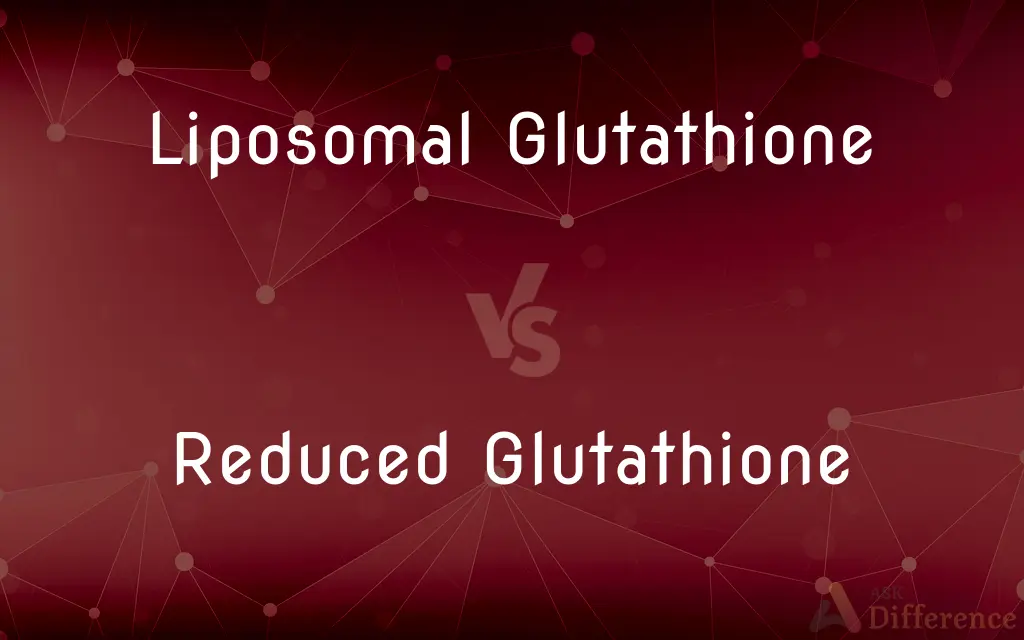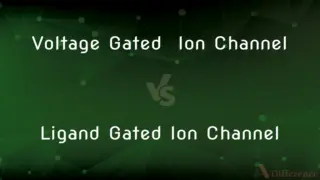Liposomal Glutathione vs. Reduced Glutathione — What's the Difference?
By Tayyaba Rehman & Fiza Rafique — Published on February 16, 2024
Liposomal glutathione is encapsulated in liposomes for better absorption, while reduced glutathione is the active antioxidant form, not encapsulated.

Difference Between Liposomal Glutathione and Reduced Glutathione
Table of Contents
ADVERTISEMENT
Key Differences
Liposomal glutathione and reduced glutathione represent two forms of the antioxidant glutathione, differing primarily in their method of delivery and bioavailability. Liposomal glutathione is encapsulated within liposomes, small vesicles that can encapsulate nutrients, enhancing their delivery and absorption by protecting them from degradation in the digestive tract. This form is designed to increase glutathione's bioavailability and ensure that more of it reaches the cells intact. Reduced glutathione, on the other hand, refers to the biologically active form of glutathione in its reduced state, which is crucial for detoxifying cells, protecting against oxidative stress, and maintaining the immune system.
The key advantage of liposomal glutathione over reduced glutathione lies in its enhanced absorption and protection against enzymatic breakdown in the gut. The liposomal encapsulation mimics the body’s own cellular structure, facilitating its entry into the bloodstream and cells. Reduced glutathione, while potent, faces challenges with direct absorption when taken orally due to its breakdown in the gastrointestinal tract, leading to lower availability to cells.
While both forms aim to supplement the body’s glutathione levels, their effectiveness can differ based on the individual's health status, goals, and the specific health conditions being targeted. Liposomal glutathione is often recommended for those seeking to maximize absorption and effect, particularly in cases of severe oxidative stress or when attempting to overcome the body's poor absorption rate. Reduced glutathione serves as a direct boost to the body's glutathione levels, but its efficacy might be limited when taken orally without the protection offered by liposomal technology.
Choosing between liposomal glutathione and reduced glutathione depends on factors like the desired therapeutic effect, potential issues with digestion or absorption, and cost considerations. While liposomal formulations may offer superior absorption, they can be more expensive. Reduced glutathione, being the direct form of the antioxidant, may be preferred for its cost-effectiveness and simplicity, despite its lower absorption profile.
In summary, liposomal glutathione offers an advanced delivery system designed to enhance absorption and bioavailability, targeting individuals needing high levels of glutathione due to specific health conditions. Reduced glutathione provides the antioxidant in its active form, suitable for general supplementation, although with potential limitations in absorption when taken orally.
ADVERTISEMENT
Comparison Chart
Delivery System
Encapsulated in liposomes for enhanced delivery
Direct form without encapsulation
Absorption
High due to liposomal encapsulation
Lower due to breakdown in the digestive tract
Bioavailability
Increased by liposomal technology
Potentially reduced by enzymatic degradation
Cost
Generally higher due to complex formulation
Lower compared to liposomal form
Best Used For
Maximizing absorption in cases of severe deficiency or poor absorption
General antioxidant support with potentially lower efficacy
Compare with Definitions
Liposomal Glutathione
Suitable for those with digestive or absorption issues.
Doctors recommended liposomal glutathione due to my gut health problems.
Reduced Glutathione
The biologically active form of glutathione in its antioxidant state.
Reduced glutathione plays a crucial role in my daily detox regimen.
Liposomal Glutathione
Offers protection against oxidative stress with high bioavailability.
Her recovery was aided by the high bioavailability of liposomal glutathione.
Reduced Glutathione
Directly supports detoxification and immune health.
To support my liver, I supplement with reduced glutathione.
Liposomal Glutathione
A form of glutathione designed for enhanced cellular uptake.
Liposomal glutathione is superior in reaching my cells directly.
Reduced Glutathione
Can be taken orally, although with varying absorption rates.
I prefer reduced glutathione for its straightforward benefits.
Liposomal Glutathione
Advanced delivery system increases glutathione levels effectively.
Liposomal glutathione has significantly improved my energy levels.
Reduced Glutathione
Essential for combating oxidative stress and maintaining cellular health.
Reduced glutathione has been key in managing my oxidative stress levels.
Liposomal Glutathione
Glutathione encapsulated in liposomes for improved absorption.
I take liposomal glutathione to ensure maximum antioxidant benefits.
Reduced Glutathione
The fundamental form of glutathione for intracellular antioxidant defense.
Supplementing with reduced glutathione has boosted my antioxidant defenses.
Common Curiosities
What is liposomal glutathione?
It's glutathione encapsulated in liposomes to enhance absorption and bioavailability.
How does liposomal glutathione improve absorption?
Liposomes protect glutathione from digestive enzymes, allowing better cellular uptake.
Why might someone choose liposomal glutathione over reduced glutathione?
For enhanced absorption, especially in cases of severe oxidative stress or absorption issues.
What does reduced glutathione refer to?
The biologically active, antioxidant form of glutathione in its reduced state.
Can reduced glutathione be taken orally?
Yes, but its absorption may be less effective compared to the liposomal form.
Can both forms of glutathione support immune health?
Yes, both forms can support immune function by reducing oxidative stress.
How does reduced glutathione combat oxidative stress?
By directly neutralizing free radicals and supporting the regeneration of other antioxidants.
Is liposomal glutathione more expensive than reduced glutathione?
Typically, yes, due to the complexity of its formulation.
How long does it take to see the effects of liposomal glutathione?
Results can vary, but some report improvements within a few weeks.
Is reduced glutathione effective for detoxification?
Yes, as the active form of glutathione, it directly supports detox processes.
What are the primary benefits of liposomal glutathione?
Improved bioavailability and protection against oxidative damage.
Are there any side effects of taking liposomal glutathione?
Generally well-tolerated, but some may experience mild digestive discomfort.
Should reduced glutathione be taken with food?
It can be taken with or without food, but some find it easier to digest with meals.
Can liposomal and reduced glutathione be taken together?
While not necessary, some may benefit from both, depending on their health goals and doctor’s advice.
Can reduced glutathione improve skin health?
Yes, by reducing oxidative stress, it can contribute to healthier skin.
Share Your Discovery

Previous Comparison
Voltage Gated Ion Channel vs. Ligand Gated Ion Channel
Next Comparison
AVI vs. MOVAuthor Spotlight
Written by
Tayyaba RehmanTayyaba Rehman is a distinguished writer, currently serving as a primary contributor to askdifference.com. As a researcher in semantics and etymology, Tayyaba's passion for the complexity of languages and their distinctions has found a perfect home on the platform. Tayyaba delves into the intricacies of language, distinguishing between commonly confused words and phrases, thereby providing clarity for readers worldwide.
Co-written by
Fiza RafiqueFiza Rafique is a skilled content writer at AskDifference.com, where she meticulously refines and enhances written pieces. Drawing from her vast editorial expertise, Fiza ensures clarity, accuracy, and precision in every article. Passionate about language, she continually seeks to elevate the quality of content for readers worldwide.













































